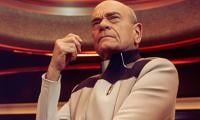Helicopter pilots were from Swabi, Kohat
SWABI/KOHAT: One of the two pilots who were killed along with foreign ambassadors in the helicopter crash in Gilgit-Baltistan was from the Swabi district, his family and relatives confirmed on Friday. Major Faisal belonged to the Chota Lahor Tehsil in Swabi. His family said that they had received the sad
By our correspondents
May 09, 2015
SWABI/KOHAT: One of the two pilots who were killed along with foreign ambassadors in the helicopter crash in Gilgit-Baltistan was from the Swabi district, his family and relatives confirmed on Friday. Major Faisal belonged to the Chota Lahor Tehsil in Swabi. His family said that they had received the sad news from Rawalpindi while his body had not reached the village.
Major Faisal, son of Abdul Wakeel, got married about two years back. He is survived by a wife and a daughter. The villagers went to his residence for offering condolences when they came to know about his death.
The body of Major Altamash, who was also killed in the helicopter crash in Gilgit-Baltistan,would be brought to Peshawar and then shifted to his ancestral village in Behzadi Chakkarkot in Kohat for burial, family sources said.
Major Altamash was the son of Dr Riaz Ahmad, who works at a private health facility in Peshawar. The family has settled in Peshawar.He left behind a widow and a seven-year old son. Altamash had got commission in the Pakistan Army in 2002. Conservatives win big in surprise UK election
Cameron returns to Downing Street in a stronger position as PM; pledges to lead a govt for ‘one nation’ and make ‘Great Britain greater’; Conservatives win 331 seats, Labour 232, SNP 56 and Lib Dems only eight; Ed Miliband, Nick Clegg and Nigel Farage resign after election disappointment; George Galloway losesMonitoring report
LONDON: The Conservative Party swept to power on Friday in Britain’s parliamentary elections, winning an unexpected majority that returns Prime Minister David Cameron to 10 Downing Street in a stronger position than before.
The Conservatives have 331 seats — four more than needed for a Commons majority — their first such victory since 1992.
In announcing his majority Conservative government, Cameron signaled a conciliatory tone, paying tribute to his former coalition partner, Liberal Democrat Nick Clegg, and the opposition Labour Party’s Ed Miliband. Both resigned as leaders of their parties on Friday after disappointing election results.
“We can make Britain a place where a good life is in reach for everyone who is willing to work and do the right thing,” Cameron said.
He promised to counter the rise of Scottish nationalism with more powers for Scotland and Wales, saying he would govern as the party of “one nation, one United Kingdom.”
Cameron announced his new government after meeting with Queen Elizabeth II. It came much quicker than expected; pre-election polls had shown the Conservatives locked in a tight race with the opposition Labour Party, raising the possibility of days or weeks of negotiations to form a government.
Ed Miliband stepped down after a “difficult and disappointing” night for Labour which saw Ed Balls lose and Jim Murphy and Douglas Alexander defeated by the SNP.
Nick Clegg said he would quit as leader after a “crushing” set of losses, which saw Vince Cable, Danny Alexander, David Laws, Simon Hughes and Charles Kennedy among a slew of Lib Dem casualties.
Nigel Farage quit as UKIP leader after failing to be elected — although he may stand in the ensuing leadership contest. He recommended Suzanne Evans take over as interim leader.George Galloway, who was reported to the police for retweeting an exit poll before voting ended, lost to Labour in Bradford West.
Labour took a beating, mostly from energised Scottish nationalists who pulled off a landslide in Scotland.Labour had 232, down 26, the Scottish National Party (SNP) had 56 seats, up 50, and the Liberal Democrats were shattered, winning only eight seats, down 49.
“I’m truly sorry I did not succeed,” Miliband said. “We’ve come back before and this party will come back again.”With the Conservatives winning an outright majority in the 650-seat House of Commons, the election result looked to be far better for him than even his own party had foreseen.
With all 650 constituencies counted, the Conservatives had 331 seats to Labour’s 232.The surprise victory ushers in a new era in British politics, as more than a dozen veteran lawmakers found themselves on the sharp side of voter anger over politics as usual.
The new class inherits a country divided by negative campaigning and infighting about the future of the United Kingdom.The election was fought over the economy and the question of whether the Conservative-led government charted the right course through the aftermath of the 2008 economic crisis, the worst recession since the 1930s.
Cameron argued his party needs more time to cement successes after five years of budget cuts designed to shrink the deficit and bolster growth.Miliband focused the debate on inequality, saying the recovery hasn’t trickled down to the poorest in this nation of 64 million.
Heaping further pressure on the working poor has been an influx of thousands of migrants from the European Union, particularly from the former eastern bloc countries that have recently joined the 28-nation free-trade zone.
Labour was routed in Scotland by the Scottish National Party, which took almost all of the 59 seats. SNP leader Nicola Sturgeon told the BBC that the vote represented “a clear voice for an end to austerity, better public services and more progressive politics at Westminster.”
“The Scottish lion has roared this morning across the country,” said former SNP leader Alex Salmond, who was elected in the seat of Gordon.Cameron’s coalition partner, the Liberal Democrat Party, faced electoral disaster, losing most of its seats as punishment for supporting a Conservative-led agenda since 2010. Clegg did hold onto his seat.
Almost 50 million people were registered to vote in Thursday’s election. Votes in each constituency were counted by hand and the results followed a familiar ritual. Candidates, each wearing a bright rosette in the color of their party, line up onstage like boxers as a returning officer reads out the results.But if the form was familiar, the results were often shocking.
Among the early Scottish National Party winners was 20-year-old student Mhairi Black, who defeated Douglas Alexander, Labour’s 47-year-old foreign policy spokesman and one of its most senior figures. Black is the youngest UK lawmaker since 13-year-old Christopher Monck entered Parliament in 1667.
One of the big losers of the day was UK Independence Party leader Nigel Farage, who resigned after losing his race. His party ran third in opinion polls, but by early Friday had won only one seat — a casualty of an electoral system in which the candidate with the highest number of votes in each area wins, even if he or she does not gain a majority of votes cast.
Since UKIP’s support is spread geographically across the country — rather than in any single area — it could be runner-up in many places with hardly a foothold in parliament.Public questions at television debates made plain that many voters distrusted politicians’ promises to safeguard the economy, protect the National Health Service from severe cutbacks and control the number of immigrants from eastern Europe.
The pound surged as much as 2 percent after exit poll results were released, as investors were reassured that the country would not see days or weeks of uncertainty over the formation of a new government.
Major Faisal, son of Abdul Wakeel, got married about two years back. He is survived by a wife and a daughter. The villagers went to his residence for offering condolences when they came to know about his death.
The body of Major Altamash, who was also killed in the helicopter crash in Gilgit-Baltistan,would be brought to Peshawar and then shifted to his ancestral village in Behzadi Chakkarkot in Kohat for burial, family sources said.
Major Altamash was the son of Dr Riaz Ahmad, who works at a private health facility in Peshawar. The family has settled in Peshawar.He left behind a widow and a seven-year old son. Altamash had got commission in the Pakistan Army in 2002. Conservatives win big in surprise UK election
Cameron returns to Downing Street in a stronger position as PM; pledges to lead a govt for ‘one nation’ and make ‘Great Britain greater’; Conservatives win 331 seats, Labour 232, SNP 56 and Lib Dems only eight; Ed Miliband, Nick Clegg and Nigel Farage resign after election disappointment; George Galloway losesMonitoring report
LONDON: The Conservative Party swept to power on Friday in Britain’s parliamentary elections, winning an unexpected majority that returns Prime Minister David Cameron to 10 Downing Street in a stronger position than before.
The Conservatives have 331 seats — four more than needed for a Commons majority — their first such victory since 1992.
In announcing his majority Conservative government, Cameron signaled a conciliatory tone, paying tribute to his former coalition partner, Liberal Democrat Nick Clegg, and the opposition Labour Party’s Ed Miliband. Both resigned as leaders of their parties on Friday after disappointing election results.
“We can make Britain a place where a good life is in reach for everyone who is willing to work and do the right thing,” Cameron said.
He promised to counter the rise of Scottish nationalism with more powers for Scotland and Wales, saying he would govern as the party of “one nation, one United Kingdom.”
Cameron announced his new government after meeting with Queen Elizabeth II. It came much quicker than expected; pre-election polls had shown the Conservatives locked in a tight race with the opposition Labour Party, raising the possibility of days or weeks of negotiations to form a government.
Ed Miliband stepped down after a “difficult and disappointing” night for Labour which saw Ed Balls lose and Jim Murphy and Douglas Alexander defeated by the SNP.
Nick Clegg said he would quit as leader after a “crushing” set of losses, which saw Vince Cable, Danny Alexander, David Laws, Simon Hughes and Charles Kennedy among a slew of Lib Dem casualties.
Nigel Farage quit as UKIP leader after failing to be elected — although he may stand in the ensuing leadership contest. He recommended Suzanne Evans take over as interim leader.George Galloway, who was reported to the police for retweeting an exit poll before voting ended, lost to Labour in Bradford West.
Labour took a beating, mostly from energised Scottish nationalists who pulled off a landslide in Scotland.Labour had 232, down 26, the Scottish National Party (SNP) had 56 seats, up 50, and the Liberal Democrats were shattered, winning only eight seats, down 49.
“I’m truly sorry I did not succeed,” Miliband said. “We’ve come back before and this party will come back again.”With the Conservatives winning an outright majority in the 650-seat House of Commons, the election result looked to be far better for him than even his own party had foreseen.
With all 650 constituencies counted, the Conservatives had 331 seats to Labour’s 232.The surprise victory ushers in a new era in British politics, as more than a dozen veteran lawmakers found themselves on the sharp side of voter anger over politics as usual.
The new class inherits a country divided by negative campaigning and infighting about the future of the United Kingdom.The election was fought over the economy and the question of whether the Conservative-led government charted the right course through the aftermath of the 2008 economic crisis, the worst recession since the 1930s.
Cameron argued his party needs more time to cement successes after five years of budget cuts designed to shrink the deficit and bolster growth.Miliband focused the debate on inequality, saying the recovery hasn’t trickled down to the poorest in this nation of 64 million.
Heaping further pressure on the working poor has been an influx of thousands of migrants from the European Union, particularly from the former eastern bloc countries that have recently joined the 28-nation free-trade zone.
Labour was routed in Scotland by the Scottish National Party, which took almost all of the 59 seats. SNP leader Nicola Sturgeon told the BBC that the vote represented “a clear voice for an end to austerity, better public services and more progressive politics at Westminster.”
“The Scottish lion has roared this morning across the country,” said former SNP leader Alex Salmond, who was elected in the seat of Gordon.Cameron’s coalition partner, the Liberal Democrat Party, faced electoral disaster, losing most of its seats as punishment for supporting a Conservative-led agenda since 2010. Clegg did hold onto his seat.
Almost 50 million people were registered to vote in Thursday’s election. Votes in each constituency were counted by hand and the results followed a familiar ritual. Candidates, each wearing a bright rosette in the color of their party, line up onstage like boxers as a returning officer reads out the results.But if the form was familiar, the results were often shocking.
Among the early Scottish National Party winners was 20-year-old student Mhairi Black, who defeated Douglas Alexander, Labour’s 47-year-old foreign policy spokesman and one of its most senior figures. Black is the youngest UK lawmaker since 13-year-old Christopher Monck entered Parliament in 1667.
One of the big losers of the day was UK Independence Party leader Nigel Farage, who resigned after losing his race. His party ran third in opinion polls, but by early Friday had won only one seat — a casualty of an electoral system in which the candidate with the highest number of votes in each area wins, even if he or she does not gain a majority of votes cast.
Since UKIP’s support is spread geographically across the country — rather than in any single area — it could be runner-up in many places with hardly a foothold in parliament.Public questions at television debates made plain that many voters distrusted politicians’ promises to safeguard the economy, protect the National Health Service from severe cutbacks and control the number of immigrants from eastern Europe.
The pound surged as much as 2 percent after exit poll results were released, as investors were reassured that the country would not see days or weeks of uncertainty over the formation of a new government.
-
 John F. Kennedy Jr. Wife Carolyn Bessette's Last Minute Bridal Crisis Revealed
John F. Kennedy Jr. Wife Carolyn Bessette's Last Minute Bridal Crisis Revealed -
 Mary Cosby Remembers Son Robert Cosby Jr. After His Tragic Death
Mary Cosby Remembers Son Robert Cosby Jr. After His Tragic Death -
 Prince Harry, Meghan Markle Face 'largely Unfair' Criticism After Jordan Trip
Prince Harry, Meghan Markle Face 'largely Unfair' Criticism After Jordan Trip -
 Priscilla Presley Makes Sweet Confession About TV Role: 'I Lied'
Priscilla Presley Makes Sweet Confession About TV Role: 'I Lied' -
 Prince Harry Feels 'hurt' For Archie, Lilibet
Prince Harry Feels 'hurt' For Archie, Lilibet -
 Keith Urban, Nicole Kidman's Daughters Choose One Parent To Side With
Keith Urban, Nicole Kidman's Daughters Choose One Parent To Side With -
 Sarah Ferguson's Hidden Trait Exposed As Expert Dismantles Shadow Side To Her Personality
Sarah Ferguson's Hidden Trait Exposed As Expert Dismantles Shadow Side To Her Personality -
 Sarah Ferguson Backed By Powerful Friends Amid Epstein Fallout
Sarah Ferguson Backed By Powerful Friends Amid Epstein Fallout -
 PINK’s Latest Move Sparks Speculations About Replacing Major Celebrity On Show
PINK’s Latest Move Sparks Speculations About Replacing Major Celebrity On Show -
 Planetary Parade 2026: Here's How To See Six Planets Aligning Today
Planetary Parade 2026: Here's How To See Six Planets Aligning Today -
 Christopher Nolan Reveals Why He's A Fan Of 'Fast & Furious' Movies
Christopher Nolan Reveals Why He's A Fan Of 'Fast & Furious' Movies -
 Ben Affleck Unable To Accept A New Lover Post Jennifer Lopez Divorce As He Still Grieves End Of Bennifer 2.0
Ben Affleck Unable To Accept A New Lover Post Jennifer Lopez Divorce As He Still Grieves End Of Bennifer 2.0 -
 Why Is Demi Moore Being Called Ozempic Victim?
Why Is Demi Moore Being Called Ozempic Victim? -
 Kaley Cuoco Makes Honest Comparison Of 'Big Bang Theory' And 'Charmed' Gigs
Kaley Cuoco Makes Honest Comparison Of 'Big Bang Theory' And 'Charmed' Gigs -
 Robert Picardo Shares Surprising Reaction On Returning To The 'Star Trek' Franchise
Robert Picardo Shares Surprising Reaction On Returning To The 'Star Trek' Franchise -
 AI Feud Deepens As Musk Targets OpenAI Over Safety Concerns
AI Feud Deepens As Musk Targets OpenAI Over Safety Concerns



